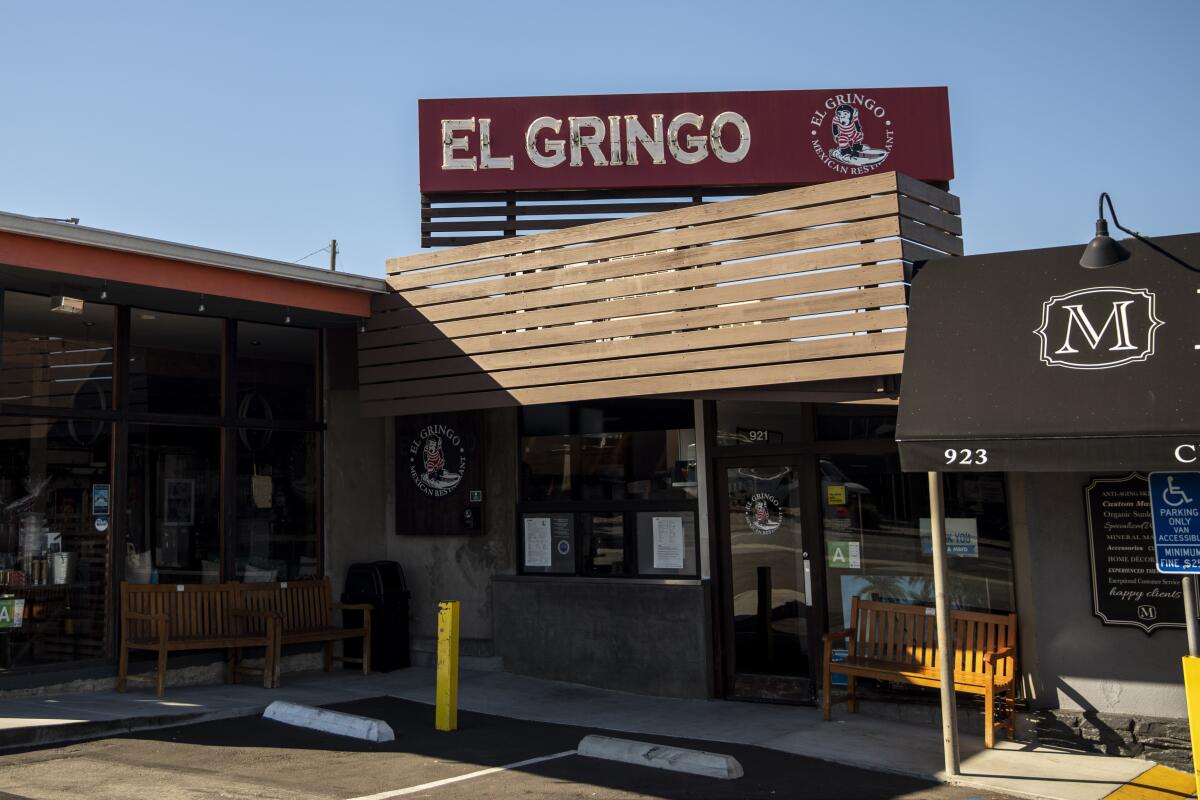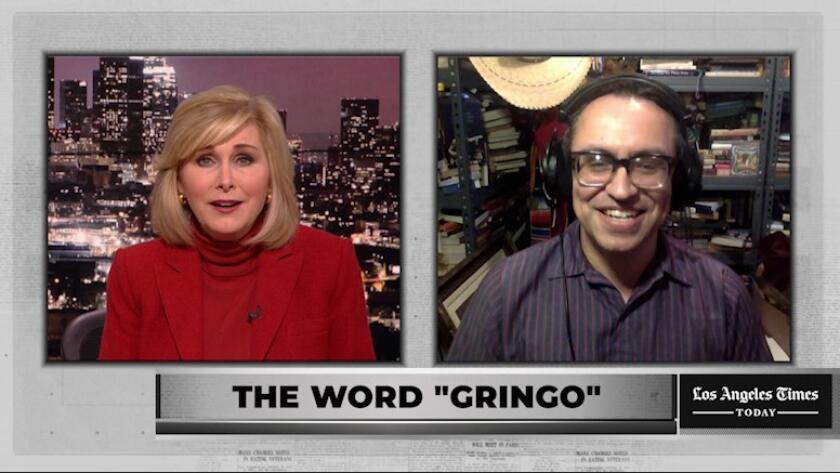The last lament of the California gringo

- Share via
One year ago this week, Chula Vista Mayor Mary Casillas Salas sat at a fancy Mexican restaurant in the city’s downtown and prepared to eat some octopus tacos dressed with habanero salsa.
Soon after, Councilmember John McCann approached her table. They chatted for a bit, then McCann admitted that he thought the restaurant’s food was too spicy.
Anyone who has dipped a tortilla chip too deep into a bowl of habanero salsa can sympathize. But Salas wanted to rib someone she had known for 20 years.
“So I said, ‘Oh, John, you’re such a gringo,’” the two-term mayor and former state assemblywoman told me in a phone interview. “And he started laughing after that.”
Salas thought nothing of saying “gringo,” a Spanish word long used in the American West to refer to white people and across Latin America to denote foreigners.
It’s technically a slur, but it’s such a part of life in these parts that its power to offend nowadays is minimal. “Gringo” and its derivatives are found in the names of restaurants small (Gringo’s Fish Tacos in Mid-City) and large (El Gringo in Manhattan Beach), in hot sauces (Gringo Bandito, by Dexter Holland of the Offspring), in bad movies (the 2018 bomb “Gringo,” which wasted the talents of Charlize Theron and David Oyewolo), in craft beers and even in clothing labels like Old Gringo Boots.
That’s why Salas was stupefied when nine days after her encounter with McCann, he filed a complaint with the city’s human resources department, alleging racial discrimination by the mayor for her “gringo” jab.
“I felt shocked by her statement,” he wrote, “since it was aimed at diminishing me because of my ethnicity and race.”
The councilmember asked that Chula Vista get someone “impartial” to investigate the incident. Two months later, an outside lawyer came back with a conclusion: Though Salas’ use of “gringo” was “inappropriate,” it didn’t constitute discrimination.
“Here the use of the word ‘gringo,’ on one occasion in this informal setting and to describe a person’s attribute of not being able to eat spicy food,” the investigation concluded, “does not rise to the level of … creating an intimidating, hostile, or offensive environment.”
The Voice of San Diego broke the story last month and also found out how much this combo platter of victimhood cost Chula Vista taxpayers: nearly $16,000.
“It was much ado about nothing,” Salas now says, “and it was a great waste of time and resources.”
When I reached out to McCann for comment, he instead sent a four-page statement in English and Spanish that accused Salas (and her ex-husband, for some reason) of a “long history of using racial insults toward others and specifically John McCann.” He offered only two examples: the one addressed by his complaint last year and a 2000 interview in which Salas told a Spanish-language publication, “Gringos don’t understand how powerful us Latinos are.”
“By diminishing racial slurs from people in power and vilifying people for making legitimate complaints to human resources,” McCann’s bilingual statement read, it “only intimidates victims not to speak up.”
I wanted to brush off this weak-salsa Gringogate as local politics at its most risible. But now there’s another San Diego County case of studied ignorance about Mexican culture that makes me think that many more such clashes are on the way in California.
In January, the California Department of Education agreed to remove a Chicano poem from its ethnic studies curriculum in response to a lawsuit filed by a group of parents represented by attorneys associated with the Chicago-based Thomas More Society. The conservative nonprofit usually argues for more religious liberty, not less — but not when it came to what the lawsuit disingenuously called an “Aztec prayer.”
The scripture in question was actually a poem, which discussed pseudo-Maya philosophical beliefs and mentioned four Aztec gods as a way to inspire Chicano students to learn about their Mesoamerican roots.
It’s an earnest, monotonous bore, honestly. But Thomas More Society lawyers convinced California’s Department of Education that the poem was a violation of the separation of church and state. And besides, according to them, “Any form of prayer and glorification of these beings in whose name horrible atrocities were performed is repulsive.”
Two of the parents who filed the lawsuit have Hispanic surnames, but, hey: Latinos can be gringos, too. Because “gringo” is a state of mind more than it is a race — a philosophy that loathes Mexican anything.
And California gringos nowadays are in crisis.
For more than 170 years, they smacked down Mexicans at any chance they got, whether by laws, propositions, appropriation, Taco Bell or just plain racism.
It didn’t work.
Latinos now make up a plurality of California’s population, and Mexicans make up an overwhelming chunk of that segment. Gringos are so worried about their future in California that they’re trying to cancel aspects of Mexican culture that they think insult them.
School boards have banned critical race theory and Chicano studies books, all because they teach an unvarnished history that shows how badly gringos treated Latinos for decades. Municipalities across the state are waging scorched-earth campaigns against street vendors because brick-and-mortar spots that do it the “right” way can’t compete with chile-soaked mangoes.
Now, the word “gringo” is verboten, and ponderous pocho poetry is suspect? What’s next: a class-action lawsuit against Día de los Muertos because it makes Halloween seem as exciting as Arbor Day? (Don’t get any ideas, gringos.)
This trend is part of what San Diego State English professor William Nericcio only half-jokingly calls the “ongoing Karen-ification of the once-mighty Caucasian tribe.”
Nericcio studies the continued evolution of anti-Mexican stereotypes in the American imagination and how whites wield them to not just demean Mexicans but also empower themselves.
Gringos, for instance, have used “gringo” to refer to themselves almost as soon as they learned what the word meant. (Within a year of its founding, all the way back in 1882, this paper used the term to mock the losing side in the Mexican-American War.)
“Being a gringo means you’re not Mexican, and there’s nothing worse in the gringo world than to be a Mexican,” Nericcio said. “The term becomes a badge of pride — it’s gringo power.”
That’s why what happened in Chula Vista worries him as much as it amuses him.
“If the councilmember [McCann] was really offended, he would’ve boo-hooed at the restaurant, and [Salas] would’ve apologized, and it would’ve been over,” Nericcio said. “But what happened during the [Donald] Trump administration was that Anglo Americans of a certain political persuasion or stripe were given license to resist what they perceive to be affronts with a kind of impassioned righteousness.”
Because of that, the professor feels actions like McCann’s complaint and the lawsuit against alleged Aztec poetry will become even more common.
“The soon-to-be-minority gringo culture,” Nericcio told me, “will mandate this kind of humorless, antagonistic approach to things.”
So lighten up, gringos. We Mexicans mostly like ustedes unless you’re angry, which too many of you seem to perpetually be. May I suggest as a stress reliever a gringa, which is a type of taco popping up across Southern California? It has everything y’all seem to enjoy: white cheese, and beef.
- Share via
Watch L.A. Times Today at 7 p.m. on Spectrum News 1 on Channel 1 or live stream on the Spectrum News App. Palos Verdes Peninsula and Orange County viewers can watch on Cox Systems on channel 99.
More to Read
Sign up for Essential California
The most important California stories and recommendations in your inbox every morning.
You may occasionally receive promotional content from the Los Angeles Times.
















